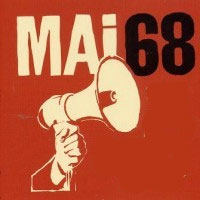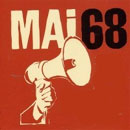 Dissatisfied students and workers, protests happening one after another, a government becoming increasingly unpopular, and a situation not improving week by week, doesn’t it remind you of anything? Like May 1968, June 2008 is filled with social movements. But on a closer look, society has changed a lot in forty years. And we no longer fight with the same ideas and weapons as in 1968. How to link the demands of high school students, opposing job cuts, with those of undocumented workers, who wish to be recognized? For Didier Turrini, general secretary of the CGT departmental union of Alpes-Maritimes, it’s normal for everyone to start from their own demands. “Everyone makes the connection with their own experiences,” he explains. By focusing the demands around common causes, like purchasing power, we manage to create a large mass movement.”
Dissatisfied students and workers, protests happening one after another, a government becoming increasingly unpopular, and a situation not improving week by week, doesn’t it remind you of anything? Like May 1968, June 2008 is filled with social movements. But on a closer look, society has changed a lot in forty years. And we no longer fight with the same ideas and weapons as in 1968. How to link the demands of high school students, opposing job cuts, with those of undocumented workers, who wish to be recognized? For Didier Turrini, general secretary of the CGT departmental union of Alpes-Maritimes, it’s normal for everyone to start from their own demands. “Everyone makes the connection with their own experiences,” he explains. By focusing the demands around common causes, like purchasing power, we manage to create a large mass movement.”
But Force Ouvrière does not see it the same way. The union refuses to join the massive unified protest on June 17. Jean-Jacques Mai, general secretary of the FO 06 departmental union, recognizes “a significant issue, concerning salaries, pensions, and working hours.” When asked about linking the different movements, he sees “no possibility: the ongoing movement in National Education will end as soon as the baccalaureate exams start on June 15. In companies, the only way to prevent the transition to 41 years of contribution for a full pension is a general interprofessional strike. The CFDT and the CGT are against it.” He fears that the demands, defended for months, will never be granted. “The texts are being debated right now in the National Assembly. They should be voted on this summer.”
Still Ideas, But Fewer Ideals
For unions, May 1968 today is definitively part of the past. This does not deny the contribution of past struggles. The strike movements of 1968 and the 1970s brought significant social advances: the 40-hour workweek – or two days off a week – dates from this time, among others. “Gains that need to be defended today,” according to Jean-Jacques Mai. For Didier Turrini, the main differences with May 1968 are found in the ambitions of the protesters. “Today, we have much fewer prospects for the future: our dreams have been largely trampled, he says. We now work with our reality: precariousness, the working conditions of temporary workers or subcontractors, for example.”
Bruno Della Sudda, candidate from NICEA (alternative left) in the last municipal elections, says society’s aspirations remain the same, in 1968 or today. “The context is not the same, he recalls. In 1968, the economic situation was good, mass unemployment was unknown. Precarity affected fewer French people. In both cases, there is a questioning of the established order: in 1968 or in 2008, we aspire to a more just, more egalitarian, and more solidaristic society.”



